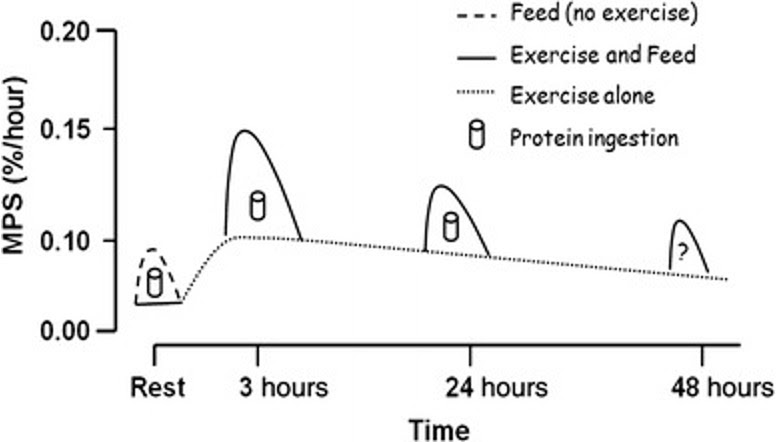What Does “Protein Absorption” Mean…?
From a nutritional view, absorption describes the passage of nutrients from the gut into systemic circulation. When people ask about absorbing protein they are usually asking about maximizing muscle protein synthesis (MPS). That’s because we want to know how much protein we need to consume in a meal or over a day to maximize MPS so that it can translate to increases in muscle mass.
Is There An Optimal Amount Of Protein To Consume Per Meal?
There are a string of studies to help us determine how much protein is optimal. One of the best was done in 2013 by Witard et al. which compared the effects of increasing amounts of whey protein (0, 10, 20, 40g) and measured muscle protein synthesis after a bout of resistance exercise. The authors found that there wasn’t much of a difference in MPS between 20 grams and 40 grams when consumed at rest, but when taken after exercise the group that consumed 40 grams of whey protein had a slight benefit. This data tells us that we might need a little extra protein after a workout compared to normal eating times and that somewhere around 20-40 grams is probably ideal. Based on this data, if we want to stay on the safe side you may want to lean more towards the 40 gram mark.
Figure 1. The effects of protein and protein with exercise on muscle protein synthesis. Image from GSSI.

Another dose-response study (0g, 15g, 30g, 45g) was completed more recently by Churchward-Venne et al., (2020) in those who had completed an endurance exercise session. The authors found that consuming milk protein consisting of 30 grams of protein resulted in a statistically significant response greater than 0 or 15 grams.
There was a small benefit to consuming 45g, but it wasn’t significant. Therefore, if you really want to make sure you are getting the best MPS response you would lean towards 45 grams and have at least 30 grams. This study adds to the idea that we need somewhere between 30-45 grams of protein after exercise to maximize the MPS response.
Another study hints at the benefit of consuming closer to ~40g of protein after exercise (Mcnaughton et al., 2016). These researchers had resistance-trained men participate in two separate trials where they did an exercise training session and consumed 20g or 40g or protein. The results indicated that myofibrillar protein synthesis was ~20% higher from consuming 40g of protein compared to 20g.
Should Protein Intake Be Based On Bodyweight or Lean Body Mass?
Protein intake requirements are often expressed relative to body size, and most typically to body weight (g/kg/day) because it’s more practical to implement for coaches. However, only one study has directly examined the impact of body size on the MPS response to feeding. It’s the same one I just described (Mcnaughton et al., 2016). When the participants were split by lean body mass, the author observed no difference in the post-exercise MPS response to protein ingestion between subjects with a relatively small or large amount of fat free mass (59 kg vs. 77 kg).
These data suggest that lean body mass is not a strong determinant of protein requirements. A potential explanation is that only a relatively small amount of essential amino acids is required as precursors for MPS, even in larger individuals.
Do Types Of Protein Influence Muscle Protein Synthesis?
We eat more than just whey protein, so we need to think about how mixed-meals affect MPS too. The closest we have are a series of studies using beef protein with varying amounts of protein. The first study compared a single serving (113 g; 220 kcal; 30 g protein) or large serving (340 g; 660 kcal; 90 g protein) of 90% lean beef. The authors found there was no difference in MPS response between the two meals.
Another used a more practical comparison (40g vs 70g) and found no difference between the two doses on the MPS response. More recently, a group of researchers completed a dose-response study on beef protein by comparing 0g, 12g, 24g, and 36 grams. The authors found that 36 grams was optimal in that case.
So, if we combine all of these studies we can see that eating a somewhat lean meat like beef at 30-40 grams in a meal is plenty. The reason we may want to eat a little more protein in mixed-meals is that it takes longer to digest.
Optimal Protein Distribution To Maximize Muscle Protein Synthesis
When it comes to protein per meal and distribution across the day, the literature is pretty slim. One of the best studies we have is from 2013, which compared three groups who completed resistance exercise followed by ingestion of 80 g of whey protein throughout 12 hours recovery in one of the following protocols: 8 × 10 g every 1.5 hours; 4 × 20 g every 3 hours; or 2 × 40 g every 6 hours. The authors found that MPS was greatest in those who consumed 4 x 20 grams of protein. Other researchers have found similar results using a 7-day crossover experiment. The authors measured changes in MPS response to isoenergetic and isonitrogenous diets with protein at breakfast, lunch, and dinner distributed evenly (EVEN; 31.5g, 29.9g, and 32g protein) or skewed (SKEW; 10g, 16.0g, and 63.4g protein). There was a ∼25% MPS response when protein intake was evenly distributed, compared with the SKEW diet. This data suggests evenly distributing protein may result in enhanced muscle hypertrophy.
CONCLUSION:
Based on the current evidence, to maximize muscle hypertrophy we should consume protein at a dosage of ~0.4-0.55 g/kg/meal across 3-6 meals in order to reach the protein target for the day, and consume 30-40 grams of protein within a few hours of training.
To understand more about the macronutrient of protein and what total intake is most optimal for you specifically, check out our article The Ultimate Guide To Protein and to learn more about protein overfeeding, to see just how far you can safely push your protein intake, listen to our podcast interview with Dr. Jose Antonio on his Protein Overfeeding Research with JISSN.
Watch Below For A Discussion On This Research Review, Between Coach Cody McBroom and Chief Science Officer Dr. Brandon Roberts:


























































































































































































































































































































































































































































































